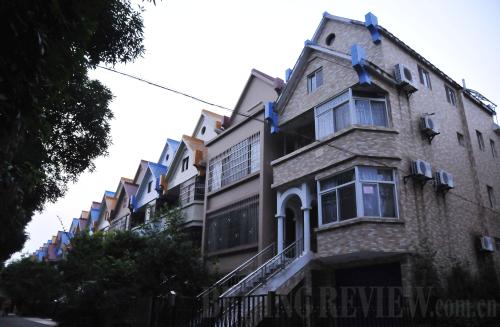|
 |
|
OBSCURED OWNERSHIP: A community in Guangzhou in south China's Guangdong Province is the site of one of the 22 properties not disclosed to discipline authorities by Cai Bin, an official ousted in 2012 amid corruption allegations (LIANG ZHIWEI) |
On October 9, an anonymous whistleblower posted records of 21 properties owned by Cai Bin, an official in Panyu District in Guangzhou, capital of south China's Guangdong Province, along with photos of Cai's undisclosed real estate holdings.
Later investigations showed that Cai and his family owned 22 properties in two districts of Guangzhou, including a villa, a factory building, apartments and commercial properties.
Cai failed to disclose personal assets as required by Party discipline. Under current circumstances, officials must disclose assets but are not obligated to publicize them. In his reports, Cai, 56, had twice told authorities that his family owned only two properties.
Cai was suspected of receiving huge bribes when he served as deputy chief of the Panyu District Public Security Bureau and head of the district's Urban Management Bureau. He had been removed from his position, said Mei Heqing, a senior official with the Guangzhou Municipal Commission for Discipline Inspection of the CPC, at a press conference on October 22.
One of the most talked about cases last year was the sacking of Lei Zhengfu, a top Party official of Beibei District in southwest China's Chongqing Municipality, 63 hours after a sex tape featuring Lei and a young woman exploded on the Internet in November.
The gaze of the public eye has never been as palpable as it is in the age of the microblog. Professor Huang Zongliang at Peking University told national broadcaster CCTV, "Every netizen can be a journalist responsible for exposing wrongdoing. Anti-corruption agencies have been acting faster to respond to public tip-offs, which is an encouraging trend."
The message from the top is just as clear. Hu Jintao, General Secretary of the 17th CPC Central Committee, said in his report to the 18th CPC National Congress last November that the fight against corruption is a clear-cut and long-term political commitment.
Xi Jinping, who was elected general secretary of the CPC Central Committee at the 18th CPC National Congress, said after his election that the Party must solve problems of "corruption, being divorced from the people, going through formalities and bureaucracy."
| 